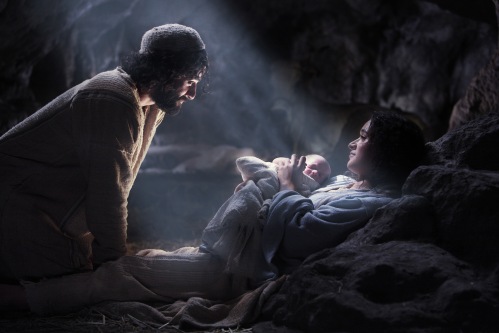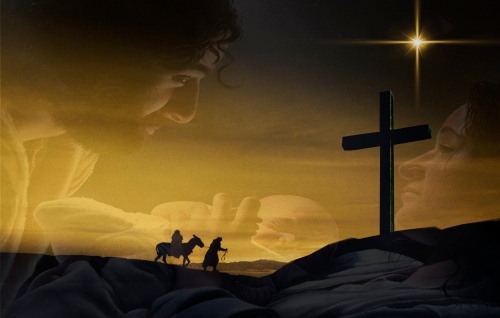
And she brought forth her firstborn son, and wrapped him in swaddling clothes, and laid him in a manger; because there was no room for them in the inn. (Luke 2:7)
In 1992, Carol Cymbala published a song, which brings a tear to my eyes when I hear the sweet, tender voice of a child sing, “Happy Birthday, Jesus.” The words are simple and true, and when intoned by a puerile melody, they grip the heart and focus the mind on the real meaning of Christmas.

Everyone, I assume, knows that Jesus was not born on December 25. The Bible does not give us a date. Was it Kislev 25, the first day of Chanukah? If that were the case, the date on the western calendar would fluctuate within the months of mid-November to mid-December. Luke recorded the events around the time of His birth thus providing an approximate year for Jesus’ arrival to earth. Augustus was emperor of Rome, and he issued an order for a census “that all the world should be taxed” (Luke 2:1), and “Cyrenius was governor of Syria” (Luke 2:2).
From Matthew’s account, we know that Herod the Great was “king” in Judah (Matthew 2:1). If secular history records accurately (and the record is dubious[1]), Herod the Great died in 4 B.C. Matthew reports that Herod, upon hearing of Jesus’ birth and not receiving word from the magi, ordered all the babies in Bethlehem, two years and under, slaughtered (Matthew 2:16). After the magi left, an angel warned Joseph to take the family and flee to Egypt, and Matthew says that they remained there until after the death of Herod. Given that we have no record of the time that elapsed between the family’s flight into Egypt and the death of Herod, Jesus’ birth could have occurred in 6 B.C. or earlier. That creates other chronological problems that distract from the point I am trying to make. (I find it strangely humorous that Jesus would be born “Before Christ.”)
The “time” of year also presents a problem. Luke records that “shepherds [were] abiding in the field, keeping watch over their flock by night” (Luke 2:8). Late December would not be a good time for shepherds to be out in the field by night. It gets cold in Jerusalem/Bethlehem in December at night! Some attempt to rationalize December 25 by suggesting that it may have been the actual time of the conception, making the delivery sometime around mid-September to mid-October, the Jewish month of Tishri. That is certainly plausible. Some suggest the conception may have been in the Jewish month of Tishri (September-October), and the birth in the Jewish month of Tammuz (June-July), and that the magi arrived on December 25, after the family had moved into a house as recorded by Matthew 2:11. That is also feasible.
Who cares! The point is that the Creator God took human form and presented Himself to His creation as fully one of them – Son of God, Son of Man; fully God, fully man. He came to us because that was the ONLY way He could save us from our sins. God took extreme measures[2] to rescue His fallen creation. That is worthy of commemoration and celebration.
December 25 seems to be a fitting time in other respects. During this time, Chanukah, the “Festival of Lights,” is celebrated. By this time, the winter solstice is past and the days start getting longer. The prophet exhorts, “Arise, shine; for thy light [speaking of Jesus] is come, and the glory of the LORD is risen upon thee. For, behold, the darkness shall cover the earth, and gross darkness the people: but the LORD shall arise upon thee, and his glory shall be seen upon thee. And the Gentiles shall come to thy light, and kings to the brightness of thy rising” (Isaiah 60:1-3). Jesus also said, “I am the light of the world: he that followeth me shall not walk in darkness, but shall have the light of life” (John 8:12, emphasis mine). With all the talk about “light,” December 25 makes as much sense as any other day to celebrate Jesus’ birthday. Happy Birthday, Jesus!
Notes:
[1] It is very probable, and more in line with the biblical account that Herod died in 1 B.C. http://www.biblicalarchaeology.org/daily/people-cultures-in-the-bible/jesus-historical-jesus/herods-death-jesus-birth-and-a-lunar-eclipse/
[2] “Extreme Measures” https://erniecarrasco.com/2016/12/11/extreme-measures/



